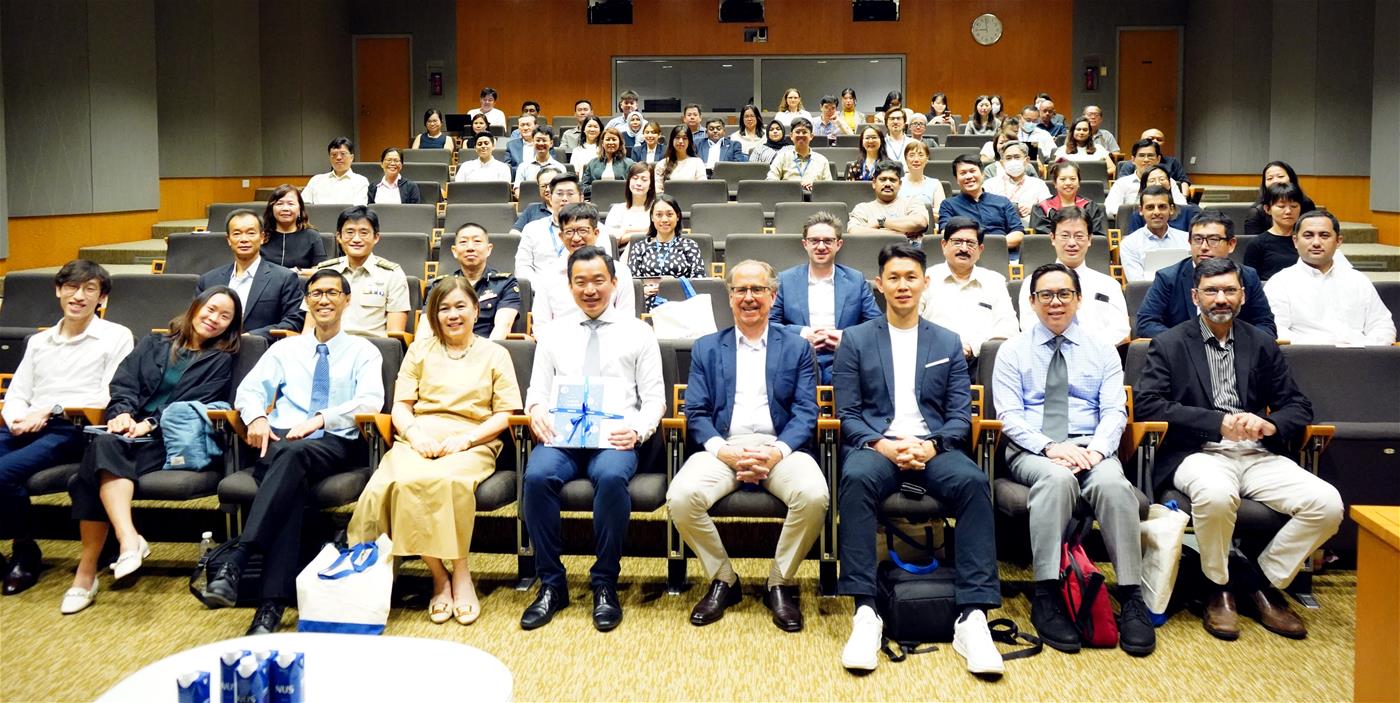Back
Wednesday, 31 Jan, 2024
Increasingly hotter climates prompt Duke-NUS summit on preventing heat-related injuries
Last year saw a large-scale assault on temperature records: 2023 was the warmest year since records began, July was the hottest month on Earth in human history and Singapore matched its historical high of 37 degree Celsius in May 2023. While this has focused much of the attention on efforts to mitigate the climate emergency, scientists, clinicians and representatives from ministries and statutory boards gathered in Singapore to shine the spotlight on education about the prevention and early treatment of heat-related injuries, which have a growing impact on populations around the world as temperatures continue to rise. Some 150 participants from around the world attended “the Impact of Climate Change on Heat-Related Injuries” seminar on 26 January in person in the Duke-NUS Amphitheatre and online.
The seminar saw participants from Singapore present their research alongside colleagues from countries as diverse as India and the United States. On the Singapore side, it brought together experts from the organisers, Duke-NUS’ Health Services & Systems Research and Pre-hospital & Emergency Research Centre and the Heat Resilience & Performance Centre at the Yong Loo Lin School of Medicine at NUS, as well as the National Environment Agency and Sport Singapore.

Guest-of-Honour Senior Parliamentary Secretary at the Ministry of Culture, Community & Youth and Ministry of Social and Family Development Mr Eric Chua (front row, fifth from left) with speakers and audience at the “Impact of Climate Change on Heat-Related Injuries” seminar // Credit: Norfaezah Abdullah, Duke-NUS
Representing the organisers, Professor Marcus Ong, Director of Duke-NUS’ Health Services and Systems Research Programme and the Pre-hospital and Emergency Research Centre, opened the seminar by extending a warm welcome to the Guest-of-Honour Senior Parliamentary Secretary at the Ministry of Culture, Community & Youth and Ministry of Social & Family Development Mr Eric Chua and all participants. He then outlined the goals of the morning, saying that “we will look at the [climate change] science behind how this is impacting health and also what is needed in terms of research public awareness and future interventions that we need to work on together”.
With the agenda set, Duke-NUS Dean Professor Thomas Coffman stepped to the front to address the audience, laying out the dire situation facing Singapore, where temperatures could exceed 35 degrees Celsius on most days of the year: “So with this threat of hotter days looming, there is a great need to equip our community with the knowledge and strategies to safeguard against heat-related injuries.”
Prof Marcus Ong delivers his welcome remarks (left) followed by Prof Thomas Coffman // Credit: Norfaezah Abdullah, Duke-NUS
Guest-of-Honour Mr Chua (centre) accepts a token of appreciation presented by Duke-NUS Dean Prof Thomas Coffman (left) and Duke-NUS Health Services and System Research Programme Director Prof Marcus Ong // Credit: Norfaezah Abdullah, Duke-NUS
After Prof Coffman’s introductory remarks, Mr Chua addressed the audience, reiterating the three-pronged strategy for climate change outlined by Singapore’s Prime Minister Mr Lee Hsien Loong at the G20 Summit in New Delhi last year. Mr Chua contexualised how the strategy’s three prongs—new technologies, new financing models and new markets—can help lead to better outcomes for patients affected by heat injuries, such as the wearable cooling device developed by Prof Ong, colleagues from Singapore General Hospital and partner Global Healthcare Singapore.
While Singapore has committed significant funding for sustainability initiatives, climate adaptation measures and low-carbon energy technologies, Mr Chua called for public-private partnerships to supplement the government’s efforts—partnerships that spark “a conversation between expert stakeholders and the community on climate change and health backed with evidence and scientific data”.
“So, this seminar today is a great starting point,” he added.
Mr Chua closed by saying: “While the challenges we face today may be complex, one thing is clear. And that is our actions today will determine the quality of life for posterity and for future generations. So let us work together to realise the shared vision of a sustainable and healthier tomorrow.”
After Mr Chua’s address, the first session started with an international perspective of extreme heat events and climate change modelling from Japan. Also sharing their findings in the international session were experts from the Republic of Korea, India and the United States. This international session ended with a panel discussion where both in person and online audience members had their questions addressed by the international speakers as they collectively explored the implications of climate change in a global health setting.
The international panel comprised (from left): Dr Fintan Hughes from Duke, Dr Ramana Rao from the Emergency Medicine Learning Centre & Research at EMRI GHS in India, and Assoc Prof Takashi Tagami from Nippon Medical School’s Musashikosugi Hospital // Credit: Norfaezah Abdullah, Duke-NUS
Members of the local panel spanned from the uniformed groups to sports medicine specialists // Credit: Norfaezah Abdullah, Duke-NUS
In the second session of the seminar, the audience learned more about the physiological impact of heat-related injuries, with a focus on prevention and early treatment, in order to guard against future mishaps in civilians and the military groups. The seminar concluded with a panel discussion of local representatives from various government sectors, stressing how Singapore has developed and implemented safety measures to ensure that the health of Singaporeans young and old, as well as foreign workers, are guarded against the rising heat.